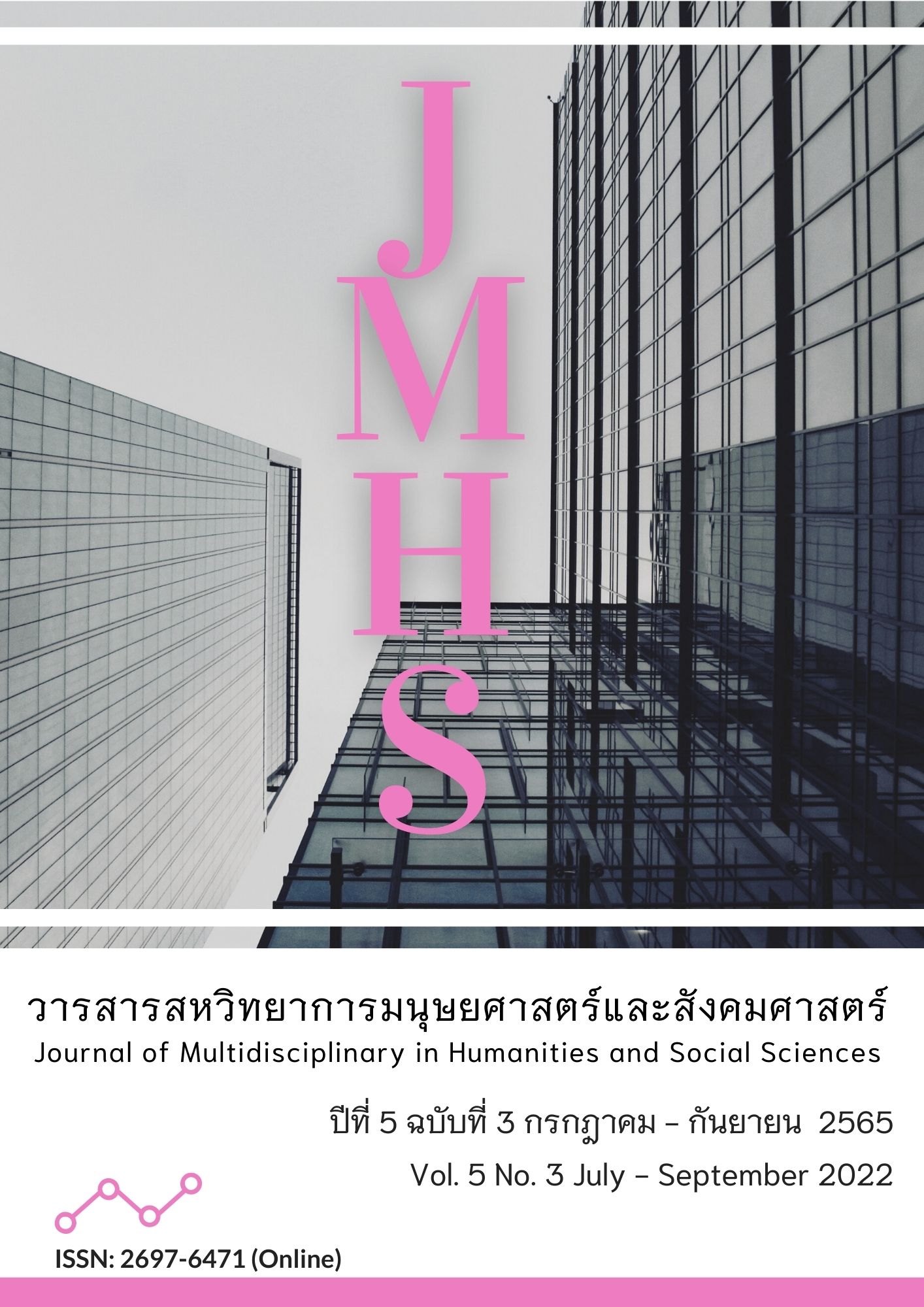การวางยุทธศาสตร์การจัดการศึกษา Next normal : ความปกติถัดไปของการจัดการศึกษาเพื่อพัฒนาคุณภาพผู้เรียน
Main Article Content
บทคัดย่อ
ในยุคที่จะมีการเปลี่ยนแปลงอย่างพลิกผัน ในสภาวการณ์ปกติถัดไป หรือ Next Normal ซึ่งจะมาถึงอย่างแน่นอน มนุษย์ในโลกนี้ไม่สามารถหลีกหนีได้ การเตรียมการรองรับการเปลี่ยนแปลงในสภาวการณ์ผันผวนที่เรียกว่า VUCA จะเป็นการเตรียมการและการวางแผนไว้ในเรื่องต่างๆอย่างมีระบบและกระบวนการ เพื่อให้บรรลุเป้าหมายที่วางไว้ โดยเฉพาะการเตรียมการและการวางแผนในการจัดการศึกษา ให้ผู้เรียนมีศักยภาพคุณภาพ รองรับการเปลี่ยนแปลงในศตวรรษที่ 21 ที่จะเป็นกำลังของชาติที่ดี และมีศักยภาพในอนาคต ซึ่งเป็นหน้าที่สำคัญของผู้บริหารการศึกษาในระดับต่างๆ
การวางแผนยุทธศาสตร์การจัดการศึกษา ที่นำหลักการซึ่งเน้นวัตถุประสงค์และผลลัทธ์เป็นสำคัญ มาใช้ในการจัดทำแผนยุทธศาสตร์การจัดการศึกษา แผนที่จะนำไปใช้จะต้องเป็นเรื่องที่สำคัญและจำเป็น และมีช่วงเวลากำหนดที่ชัดเจน ภายใต้รูปแบบการมีส่วนร่วมของหุ้นส่วนพันธมิตรทางการศึกษา หรือหุ้นส่วนทางกลยุทธ์ของผู้มีส่วนเกี่ยวข้องตั้งแต่ระดับกระทรวงศึกษาธิการ กรม จังหวัด เขตพื้นที่การศึกษา และสถานศึกษา มาขับเคลื่อนและการดำเนินงาน เพื่อให้เป็นไปตามแผนยุทธศาสตร์การจัดการศึกษาที่กำหนดไว้ มีการประเมินผลการดำเนินงานอย่างเป็นระบบ มีการจัดการศึกษาที่เน้น “ผู้เรียน”เป็นสำคัญ
Article Details

อนุญาตภายใต้เงื่อนไข Creative Commons Attribution-NonCommercial-NoDerivatives 4.0 International License.
ทัศนะและความคิดเห็นที่ปรากฏในวารสาร ถือเป็นความรับผิดชอบของผู้เขียนบทความนั้น และไม่ถือเป็นทัศนะและความรับผิดชอบของกองบรรณาธิการ
เอกสารอ้างอิง
เกรียงศักดิ์ เจริญวงศ์ศักดิ์. (2559). คนเก่งสร้างได้ อารยโมเดล สมรรถนะ KSL31220. กรุงเทพฯ: ซัคเซส มีเดีย.
ขัตติยา ด้วงสำราญ. (2564). บริหารความเสี่ยงอย่างไรให้องค์กรไร้วิกฤต. วารสารสหวิทยาการมนุษยศาสตร์และสังคมศาสตร์, 4(1), 340-351. สืบค้นจาก https://so04.tci-thaijo.org/ index.php/jmhs1_s/article/view/246481
ณรงค์วิทย์ แสนทอง. (2562). คู่มือประยุกต์ใช้ระบบบริหารผลงานด้วยแนวคิดแบบ OKRs. กรุงเทพฯ: ซีเอ็ดดูเคชั่น.
ณัฐยา สินตระการผล. (2561). The essentials 10 สุดยอดหลักบริหาร. กรุงเทพฯ: เอ็กซเปอร์เน็ท.
เทพยพงษ์ เศษคึมบง. (2565). การปรับเปลี่ยนสภาพแวดล้อมการเรียนรู้ในระดับอุดมศึกษาสู่ความปกติในสถานการณ์วิกฤติโควิด-19. วารสารรัชต์ภาคย์, 16(44), 1-13. สืบค้นจาก https://so05.tci-thaijo.org/index.php/RJPJ/article/view/254596
ธงชัย สมบูรณ์. (2563, 8 พฤษภาคม). The Next Normal ภูมิคุ้มกันของสังคมไทยในอนาคต. สืบค้นเมื่อ 14 มีนาคม 2565, จาก http://doh.hpc.go.th/bs/topicDisplay.php?id=394.
ประกาศเรื่อง ยุทธศาสตร์ชาติ (พ.ศ. 2561- 2580). (2561, 13 ตุลาคม). ราชกิจจานุเบกษา. เล่ม 135 ตอนที่ 82 ก หน้า 1-71.
มันนี่ แอนด์ เวลท์ พลัส. (2563). VUCA World คืออะไร: ปรับตัวอย่างไรในสถานการณ์วิกฤตโลก 2020. สืบค้นเมื่อ 10 มีนาคม 2565, จาก https://www.moneyandwealthplus.com/blog-th/vuca-world-...A3/.
เรืองฤทธิ์ เกษสุวรรณ. (2550). การจัดการคุณภาพ. กรุงเทพฯ: บพิธการพิมพ์.
วิจารณ์ พานิช. (2556). ครูเพื่อศิษย์สร้างห้องเรียนกลับทาง. กรุงเทพฯ: มูลนิธิสยามกัมมาจล.
วิฑูรย์ สิมะโชคดี. (2560, 27 พฤษภาคม). ผลร้ายต่อองค์กรในยุค VUCA world. สืบค้นเมื่อ 8 มีนาคม 2565, จาก https://www.matichon.co.th/news/567047.
ศิวาพัชญ์ บำรุงเศรษฐพงษ์, สุบิน ยุระรัช และ เกรียงไกร สัจจะหฤทัย. (2564). ตัวแบบการพัฒนาคุณลักษณะด้านดิจิทัลสำหรับผู้บริหารสถานศึกษาระดับมัธยมศึกษา สังกัดสำนักงานคณะกรรมการการศึกษาขั้นพื้นฐาน. วารสารศิลปการจัดการ, 5(3), 688-702.
ศรวิษฐ์ ฤทธิ์มนตรี และ วิเชียร รู้ยืนยง. (2562). กลยุทธ์การเสริมสร้างความเป็นผู้บริหารมืออาชีพยุคการศึกษา 4.0 สังกัดสำนักงานเขตพื้นที่การศึกษามัธยมศึกษา ในภาคตะวันออกเฉียงเหนือ.วารสารมหาจุฬานาครทรรศน์, 6(9), 4364-4381.
สุนิสา กัณทะพงศ์, เกียรติชัย กาฬสินธุ์ และ พันธ์ณภัทร์ เศวตภาณุวงศ์. (2559). ปัจจัยของพันธมิตรที่มีผลต่อความสำ เร็จในการสร้างคุณค่าที่ใช้ร่วมกันกับสังคม. วารสารวิจัยและพัฒนา มจธ. 39(4), 649-659.
สำนักงานเลขาธิการสภาการศึกษา. (2563). ข้อเสนอระบบการเรียนรู้ที่ตอบสนองการเปลี่ยนแปลงของโลกอนาคตในปี 2040. กรุงเทพฯ: สำนักงานเลขาธิการสภาการศึกษา.
สำนักงานเลขาธิการสภาการศึกษา. (2564). รายงานการศึกษารูปแบบการจัดการเรียนรู้สำหรับนักเรียนระดับการศึกษาขั้นพื้นฐานที่ได้รับผลกระทบจากสถานการณ์ COVID-19 . กรุงเทพฯ: สำนักงานเลขาธิการสภาการศึกษา.
เอช อาร์ โน้ต เอเชีย. (2564, 3 มีนาคม). VUCA ในโลกการทำงานสมัยใหม่: 4 เทคนิครับมือความไม่แน่นอนสำหรับผู้นำยุคใหม่. สืบค้นเมื่อ 25 มีนาคม 2565, จาก https://th.hrnote.asia/ orgdevelopment/vuca-for-leader-in-future-work-03032021/.
Phumphongkhochasorn, P., Damnoen, P. S., Suwannaprateep, T., & Phoomparmarn, U. (2021). National Educational Standards and the Improvement of Thai Education System with World Class. Asia Pacific Journal of Religions and Cultures, 5(1), 75–86. Retrieved from https://so06.tci-thaijo.org/index.php/ajrc/article/view/245928
Tan, C. C., Damnoen, P. S., Huanjit, P. S., Toprayoon, Y., Jankaew, W., & Pindon, P. S. (2021). A Socio-Cognitive Structured Stimuli in Validating Students’ Organistic States Represented by Self-Efficacy and Psychological Engagement for Career Search Self-Efficacy. Review of International Geographical Education Online, 11(10), 2163-2174.


